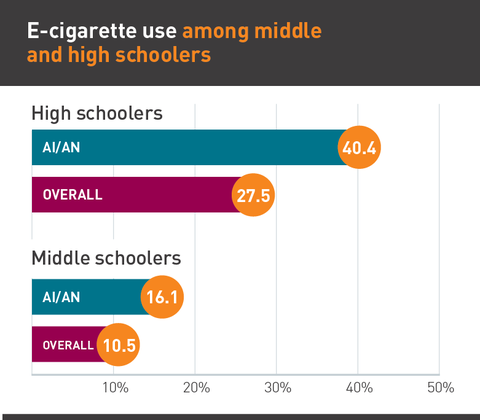Table of Contents
During this time, Indigenous Americans were restricted to a lot more highly addictive and damaging types of commercial cigarette; dependency to business cigarette, such as cigarette smoking, ended up being much more prevalent amongst Indigenous people. In Minnesota, 59 percent of American Indian grownups smoke (TTUP, 2013), compared to 14. 5 percent of Minnesota's total populace (BRFSS, 2017).

According to findings from the Wisconsin American Indian Young People Cigarette Survey (2008-2009), the use of traditional cigarette in events is a safety aspect against tobacco misuse. Young people that use conventional tobacco in ceremony were much less likely to have ever smoked commercial tobacco or to have actually smoked business tobacco in the last thirty day than those that had not.
The Ultimate Guide To History Archives
They likewise have leadership chances, organize neighborhood cultural events, and engage with other Native American organizations in the Double Cities as part of their larger community. A recent Ain Dah Yung community survey verified that youths are attracted to the program partially as a result of the community connections and assistance systems that flourish below.
When she goes to collect in the yard, or goes searching, she provides the cigarette in thanks. "For that pet providing their spirit to you, for that plant providing the gift of food, for their gift of life and nutrition, you provide your tobacco.
Things about Native Americans Smoked Tobacco Long Before ...

When I take a look at a child I collaborated with when he was nine years of ages and currently they're 20 something, and have children, and they're living this life, we understand that what we do works." Download this tale: Conventional cigarette usage links Indigenous young people to society, area, and health (PDF) The Tobacco-Free Communities Grant Program funds local neighborhood gives and technological help and training grants that intend to reduce and avoid youth cigarette usage and address tobacco-related differences in Minnesota by advertising community-driven tobacco prevention and control activities and methods.
The manidog (spirits) are said to be incredibly warm of cigarette and that the only way they might get it was from the Indians, either by smoke from a pipeline or by offerings of completely dry cigarette. According to practice, the Indians got tobacco as a gift from Wenebojo who had taken it from a hill titan and after that provided the seed to his siblings.
The 45-Second Trick For A Brief History Of Tobacco
Dry cigarette was positioned at the base of a tree or hedge from which medicine was collected, and a pinch was included the water prior to each day of wild rice event to ensure tranquil weather and an abundant harvest - cultural significance of native smokes. Before laying out in a canoe, a safe return was ensured by supplying tobacco on the water
Tobacco was positioned at tombs as an offering to the left spirit. Prior to all spiritual ceremonies, tobacco was offered to the spirits.
The smart Trick of Native Cigarettes Are Now A Problem For Western Provinces, ... That Nobody is Discussing
When a medicine man agreed to approve a customer's case, he suggested it by taking the used present of cigarette. cultural significance of native smokes. Tobacco likewise sealed peace treaties in between people and contracts in between people.
Cigarette smoking together was additionally a way to seal bargains or agreements in between leaders of different teams, and providing a pipeline to a person suggested an end to hostilities. Smoking a pipeline as part of an event or spiritual offering seems to have actually had to do with as usual as cigarette smoking it for personal fulfillment.
The Main Principles Of Smoke Signal
Kinnickinnick-- various other organic substances, usually red willow-- was mixed with strong native tobacco in differing total up to fit the individual smoker. Individual pipes were tiny with a short stem. Kinnickinnick (an Ojibwe word) actually means "what is blended," and refers to plant products that Indian people blended with tobacco for smoking.
He after that made a drying out rack by splitting one of the peeled stems midway down and opening up completion to form a Y. The opened up section was then woven with criss-crosses of other split stems to create a grid, and on this, he placed the coils of inner bark. He required the rack into the ground diagonally simply over a low fire, so the bark had to do with a foot over the fires and can dry out in the heat without being melted.
The Only Guide to Smoke Signals: The Importance Of Oral Tradition In Native...
Long earlier, when the Potawatomi still survived the sea in the east and close to their grandpas the Delaware, an old male had a desire that something remarkable would expand in his yard which was in a clearing up he had made nearby - cultural significance of native smokes. In his desire, he was advised never ever to let any kind of women approach his farm, so he cut down trees so they dropped over the stumps and made a natural fence
His uncles and nephews teased him concerning his yard and asked him exactly how he expected a plant of anything when he had grown no seed. They teased him so much that he blew up, and when everybody else took place the summertime hunt in July, the old male remained at home to tend to his field.
Table of Contents
Latest Posts
The 7-Minute Rule for 14 Seo Case Studies You Can Learn From
Fascination About Smoking, Race And Ethnicity: Tobacco Use And Native ...
Some Known Incorrect Statements About Traditional Uses Of Tobacco Sacred Medicine
Navigation
Latest Posts
The 7-Minute Rule for 14 Seo Case Studies You Can Learn From
Fascination About Smoking, Race And Ethnicity: Tobacco Use And Native ...
Some Known Incorrect Statements About Traditional Uses Of Tobacco Sacred Medicine